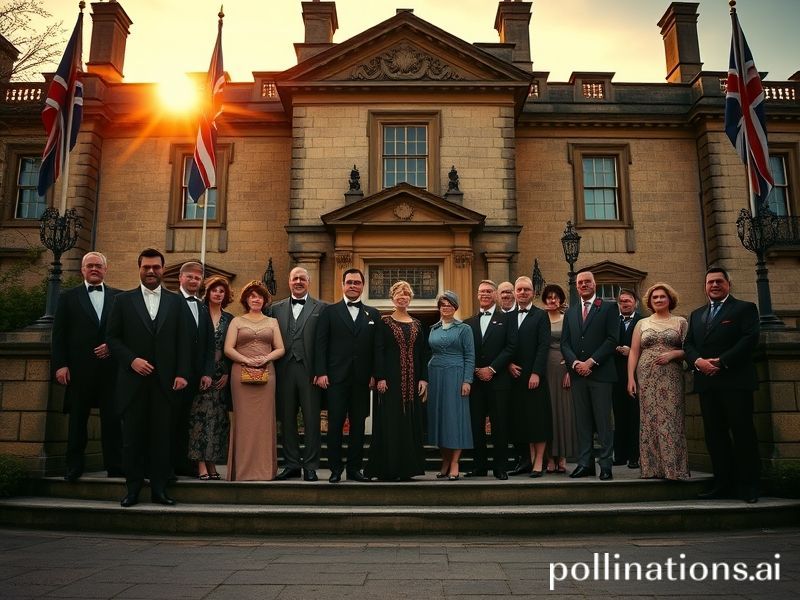Downton Abbey Ends: How the World’s Favorite Aristocrats Became the Opiate of the Masses
Downton Abbey: The Grand Finale – A Requiem for Empire, Served with Tea and Schadenfreude
By Our Man in the Cosmopolitan Wreckage
So the bells have tolled at last for the Crawleys, and the final credits of Downton Abbey: The Grand Finale have rolled over a lingering shot of Highclere Castle at sunset, looking every inch like a Brexit commemorative coin carved in stone. From Singapore to São Paulo, binge-watchers have pressed pause on their own local catastrophes to watch the British upper crust fret about napkins one last time. The planet may be on fire, but thank heavens Lady Mary found the correct tiara.
The global significance of this particular curtain call is, of course, preposterous—yet oddly instructive. The series has been sold to 250 territories, subtitled in more tongues than the average UN resolution, and streamed in bandwidth-starved favelas where the concept of “downstairs” is less a polite euphemism and more a literal basement flooding with sewage. In effect, Downton became the West’s most successful heritage export since the concept of compound interest, a soothing bedtime story for late capitalism.
Consider the geopolitical scenery: while Ukrainian drones zig-zag over Russian oil depots and Chinese property giants evaporate like spilled gin, millions of viewers chose to watch Carson the butler agonize over silver-polish shortages circa 1928. It’s escapism, certainly, but of a curiously imperial flavor—comfort food seasoned with the faint taste of gunpowder and opium. The world’s emerging economies, whose grandparents were on the receiving end of British “civilizing missions,” now pay Netflix extra to revel in the posh accents that once commanded their grandparents to dig railways.
The finale itself was a masterclass in narrative damage control. Creator Julian Fellowes tied every loose ribbon so tightly you could hear the corsetry creak: Lady Edith finally lucked into marital bliss, Branson the reformed Irish terrorist got a Labour peerage (because nothing says socialism like a seat in the House of Lords), and even Thomas Barrow’s conversion from sniveling Machiavelli to kindly hospital porter felt suspiciously like a diversity-and-inclusion PowerPoint rendered in tweed. In the final frame, the family toasts “the future” with a champagne that was probably bottled before the Suez Crisis, and we’re meant to believe the future still includes them.
International audiences responded with the sort of sentimental resignation normally reserved for funerals of distant relatives who owed you money. German critics praised the “Konservative Schönheit,” Japanese viewers live-tweeted tear-emoji kabuki, while Brazilian TikTokers edited the closing montage to a baile-funk beat, inadvertently inventing “Baroquecore.” The UN, meanwhile, issued no statement—though several junior staffers in Geneva were spotted streaming it on mute during a Security Council briefing on Sudan.
What does it all mean? Nothing, and everything. In an age when billionaires launch themselves into low-orbit vanity projects and the rest of us haggle over egg prices, the fantasy of a fixed social order—where everyone knows their place and the silver is always polished—has achieved the status of global narcotic. Downton sells certainty in an uncertain world, the same way Marlboro once sold cowboys to asthmatic city kids. The difference is that cigarettes came with a health warning; heritage porn comes with a gift shop.
We should pause to admire the perverse efficiency of it all. Britain has monetized its own decline so thoroughly that even the funeral is a franchise opportunity. Expect Downton-branded scones in Dubai duty-free, a CGI sequel set on a Caribbean plantation (“Downton: Rum & Retribution”), and—why not?—a metaverse where users can pay in Ethereum to curtsy before Maggie Smith’s NFT likeness. The empire strikes back, one sponsored Instagram reel at a time.
And yet, as the lights dimmed on that absurdly photogenic dynasty, a billion screens flickered in unison, reflecting faces from Lagos to Lahore who recognized the same old hierarchy dressed in newfangled pixels. We may not have inherited the manor, but we’ve all learned to speak the language of deference. The world is burning, darling—but do mind the cinders on the Axminster.







